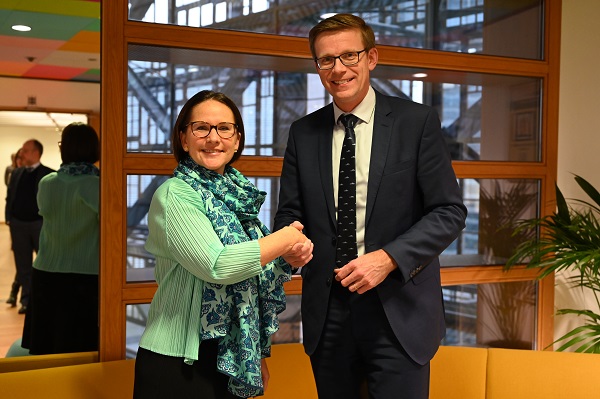 (L-R) Yuriko Backes, Luxembourg's Minister for Mobility and Public Works; Martin Kupka, Minister of Transport of the Czech Republic;
Credit: MMTP
(L-R) Yuriko Backes, Luxembourg's Minister for Mobility and Public Works; Martin Kupka, Minister of Transport of the Czech Republic;
Credit: MMTP
On Monday 4 December 2023, Luxembourg's Minister for Mobility and Public Works, Yuriko Backes, participated in her first Transport, Telecommunications and Energy Council of the European Union in Brussels, Belgium.
During this Council meeting, which was the last of the "Transport" formation for the current legislative cycle ahead of the 2024 European elections, EU ministers approved a number of general guidelines covering a range of areas relating to road and maritime transport and safety, as well as intermodal transport.
The agreements adopted during the Council related to the following legislative proposals:
- the reform of the driving licences legislation;
- the revision of the directive facilitating the cross-border exchange of information on traffic offences;
- the modification of the regulation on breaks and rest periods in the occasional passenger transport sector;
- the revision of the Port State Control Directive;
- the revision of the directive on ship-source pollution;
- the revision of the directive on compliance with flag state requirements:
- the amendment of the directive on the investigation of marine accidents;
- a regulation on the accounting of greenhouse gas emissions of transport services.
Among these, the two most important files for Luxembourg, as reported by the Ministry of Mobility and Public Works, are part of the package of measures relating to road safety, namely the driving licences reform and the revision of the directive facilitating the cross-border exchange of information on traffic offences.
Regarding the driving licences reform, Minister Backes recalled that the introduction of a digital driving licence represents a "significant" innovation for European citizens and particularly for professional drivers. She added that this will facilitate free movement within the European Union and make a "decisive" contribution to the deepening of the single market. The minister agreed with those of her counterparts who had stressed that the agreement on this general approach represented an acceptable but still imperfect compromise. She informed the Council that during the negotiations with the European Parliament, Luxembourg will remain particularly vigilant with regard to a possible rearrangement of the provisions on the period of validity of driving licences, the provisions relating to medical assessments for fitness to drive and possible additional flexibilities for obtaining a lorry licence.
Concerning the revision of the rules on the exchange of cross-border information on traffic offences, Luxembourg - together with Germany, Poland and Romania - reiterated its substantive reservations regarding the expansion of the scope of the initial proposal to offences which do not relate to road safety, such as for example non-compliance with restricted access zones or dangerous parking.
In this regard, Minister Backes noted in particular that expanding the scope of application would risk producing an uncontrolled increase in the number of requests for mutual assistance and generating "unnecessary" administrative burdens for the competent national administrations. By risking drowning the most serious cases in a continuous flow of fines for less serious offences, the real effect on the ground would be contrary to the objective sought in terms of road safety and the "Vision Zero" policy, she argued. The minister spoke out in favour of a genuine European approach to road safety, including with regard to the definition of offences and sanctions, which differ from one country to another.
Minister Backes also spoke on a proposal to amend the directive on weights and dimensions for heavy duty vehicles. She reiterated Luxembourg's position which consists of asking that the latter be treated in parallel with the new proposal on intermodal transport, in particular to avoid inconsistencies between these two closely linked files which she felt would ultimately disadvantage rail transport.
Later on, the Spanish Presidency of the Council of the European Union, for which this was the last meeting of the Transport Council before the handover to the Belgian Presidency on 1 January 2024, presented a report on the files currently being negotiated within the Council or with the European Parliament, including the (blocked) revision of the regulatory framework for the management of European airspace (Single Sky 2+). Many delegations voiced their support for a joint statement by France, Germany, the Netherlands and Luxembourg in this regard, noted the ministry.
The ministers also participated in a working lunch during which they held an informal exchange on the financing of investments in trans-European transport network projects, in the presence of the European Commissioner for Transport, Adina Vălean. During this lunch, Minister Backes recalled the importance of the financial support programme of the Connecting Europe Facility (CEF) for the economic development and growth and the security of the EU, particularly in a difficult geopolitical context. However, she also stressed that financial support cannot represent an end in itself, but must be a function of the quality of the projects introduced and the progress made in their implementation. She added that Luxembourg is aware of the importance of the solidarity dimension of the programme and will "live up to" its responsibilities in this regard.
On the sidelines of the Council, Luxembourg's Mobility Minister met several of her counterparts, notably Belgium's Georges Gilkinet. The two ministers discussed the priorities of the Belgian presidency, as well as railway relations between Belgium and Luxembourg. Minister Backes also had a meeting with Hungary's Deputy Minister of Construction and Transport, Nándor Csepreghy; Hungary will hold the presidency during the second half of 2024. Finally, the Luxembourg minister spoke with Czech counterpart, Martin Kupka.








